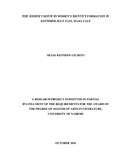| dc.description.abstract | This research project examines the use of the journey motif in David Mulwa‟s novel Flee, Mama Flee. The study explores the significance of the journey motif and how it is appropriated as a tool in female identity formation particularly during the colonial condition in Kenya. More specifically, the work examines the physical, psychological and emotional facets of the journey motif; and how the journeys imbedded in the motif help shape or define female identity in a subjugated society where the plight of women is far worse off compared to their male counterparts, first due to African traditional patriarchal structures and secondly as a result of foreign subjugation. This study, therefore, examines how the physical movements, psychological reawakening and emotional maturation help to (re)form women‟s fluid or lost identity. The work is based on feminist, psychoanalytic and postcolonial theories, particularly African feminism and Carl Jung‟s psychoanalysis strands respectively. Molara‟s strand of “The Six Mountains on the Woman‟s Back” is used to explore the “mountains” that have been placed on the woman‟s back, rendering her identity crushed and thus the need to embark on journeys to reclaim it. To trace the physical journeys, the study is based on identification of the basic motifs of a journey such as the departure, the obstacles and the return, which are instrumental in examining the processes through which the female protagonists pass through on their way towards achieving their quest of embracing a new identity. Jung‟s tenet of the “unconscious” as brought forth through dreams and mental states becomes necessary in tracing the psychological and emotional movements of the characters. The postcolonial strand of “Writing Back to the Empire” is used to examine how the colonial subjects strive to transcend colonial oppression and form identity by re-writing their misrepresented history. The research work is based on textual analysis of the setting, plot development, characterization and use of language as part of the methodology in the interpretation of thematic concerns in the novel. In the text, women undertake many rigorous journeys which greatly (re)define and determine who they are in the colonized and male dominated society. Where they were under colonial and patriarchal subjugation, they end up in free environments where they are able to form a new identity. The completion of the journeys helps them transcend colonial and cultural oppressions to become comfortable and fulfilled women. The project further analyzes the author‟s subversion of gender roles in a society where males are perceived to be superior and at the lead in the fight against colonialism, but where females end up taking the first position to champion for liberation from colonial rule. The journey motif is, therefore, an effective technique that helps us to examine how the female protagonists formed their identity during the colonial epoch in Kenya. | en_US |



